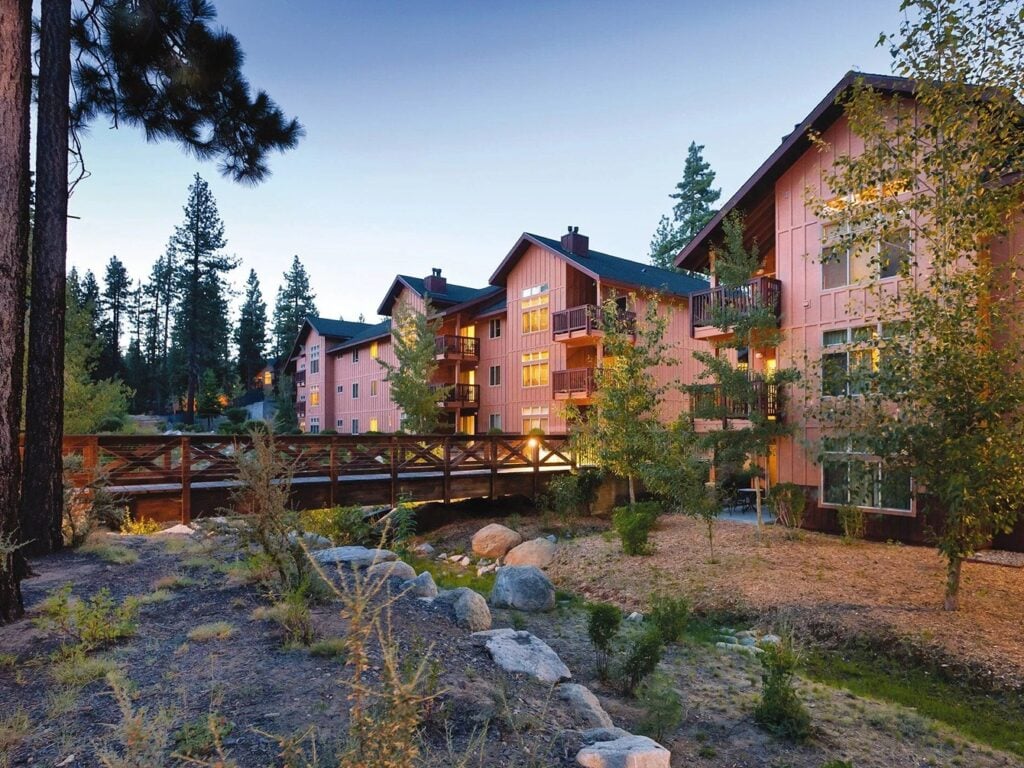There’s a lot to learn about the timeshare industry. So, before you dive into ownership, make sure you knows the basics, starting with types of timeshares. From deeded weeks to leasehold points, the different types of timeshare work to suit your travel and financial needs. So, let us help you find the perfect timeshare for you based on your personal circumstances and preferences today. Read on to learn more about the different timeshare types and how you can become an owner for less.
- Different Timeshare Types
- Which Combination of Timeshare Type and Subtype Is the Best?
- Browse Different Types of Timeshare Resales
- Rent a Timeshare and Experience the Ultimate Vacation Freedom
Different Timeshare Types
To begin, there are three main types of timeshare contracts and even more types of timeshare sub-types. New owners can find a wide array of timeshare interests at unforgettable resort locations around the world. However, timeshares tend to be a lifetime product, and like buying a house, you can’t just walk away from a timeshare contract. Therefore, familiarizing yourself with the various types of timeshares is essential before you buy, as you’ll want to make sure you’re satisfied with your purchase. Odds are, you’ll have it for a while. But don’t worry. We’re here to break down the different types of timeshare ownership and timeshare contracts step by step. Let’s get started!
Types of Timeshare Contracts



There are three main types of timeshare contracts: deeded, right to use, and leasehold. Let’s break down these types of contracts and look at some of the pros and cons you should know before you buy.
Deeded Timeshare Types
With a deeded timeshare contract, owners enjoy usage rights at their timeshare during a specific week. Deeded timeshare owners own their week outright and, therefore, are free to sell, rent, or gift their ownership. Until relatively recently, deeded weeks dominated the timeshare market. These days, however, deeded timeshare weeks have begun to phase out in favor of more flexible types of contracts. However, this deeded ownership timeshare type can still be found for sale, especially on the resale market, and may be suitable for vacationers who like to travel at the same time every year. Perks of deeded timeshares include ownership security, the ability to rent it out to mitigate ongoing costs, or legacy planning.
Right-to-Use (RTU) Timeshare Types
Did you know that the first ever timeshare model was a right-to-use timeshare? This model originated in Switzerland in 1963 as a way for a handful of guests to enjoy the use of a resort property for a specified period of time. This being said, a right-to-use (RTU) timeshare does not involve a deeded contract and, thus, is not owned outright. As with a deeded timeshare, however, a right-to-use timeshare contract does specify when your ownership expires.
Generally speaking, the terms of a right-to-use contract last from 30 to 99 years. While the contract can’t be broken before the expiration date, right-to-use owners can still sell their timeshare on the resale market, as well as rent out their points/weeks if permitted by their resort developer. However, since they are not owned outright, they are not eligible for a timeshare donation. Perks of right-to-use timeshare types include added flexibility with points-based models, a defined end date, and a potentially less expensive initial purchase price.
Leasehold Timeshare Types
Leasehold timeshares are types of timeshares in which the timeshare developer leases land from a land developer and builds their resort on the leased land. Thus, when the timeshare developer’s lease expires for a particular timeshare property, every owner’s contract expires, as well. Leasehold timeshare types typically last anywhere from 20 to 80 years, unless you’ve purchased your contract on the resale market, in which case you may receive a timeshare with less allotted time.
Leased timeshare contracts do, however, grant the same benefits and usage rights as other types of timeshare contracts, including points-based ownerships and a set end date. Moreover, owners of leasehold timeshares can sell their ownership on the resale market and rent out their points/week if permitted by their resort developer. The most famous example of a timeshare company that uses leasehold contracts is Disney Vacation Club.
Timeshare Sub-Types



In addition to timeshare types, there are different sub-types of timeshare ownership to choose from. So, while the three categories listed above refer to your contract type, the types of timeshares below relate to how, when, where, and for how long you can use it. Now, let’s take a look at the different timeshare sub-types and how they might rise to or fall short of your needs.
Points-Based Timeshare Ownership
These days, the most common timeshare subtype is the points-based timeshare. This subtype has gained popularity due to its vacation flexibility. With a points-based timeshare, owners join a points club and purchase a home timeshare in the form of vacation points. The number of points an owner receives is determined by the value of their home timeshare, and the points act as vacation currency. When the owner wants to take a vacation, they can choose to stay at their home resort. If an owner would like to stay at other resorts within their brand’s portfolio that are not their home resort, they can use their points to book these stays. If their home timeshare is more or less valuable than the timeshare they want to stay at, they can usually bank or borrow points accordingly. Or, owners can purchase additional points off the resale market or from their developer.
As mentioned, this timeshare subtype offers the most flexibility, as points allow owners to decide when, where, and for how long they want to vacation. However, as vacations are not determined in advance, owners must plan ahead of time and run the risk of not reserving the dates/resort they want. Club Wyndham, Marriott Vacation Club, and Hilton Grand Vacations are all timeshare companies that offer points-based ownership.
Biennial Timeshare Purchases
As the name implies, biennial timeshare types confer usage rights every other year. Depending on the last digit of the year, biennial timeshares can either be classified as even or odd. A biennial timeshare is a great option for owners who don’t travel every year. They may also be cheaper than timeshare sub-types that grant more frequent usage, and maintenance fees are typically lower as well. Keep in mind, however, that it may not always be possible to travel during the years in which your timeshare is available, as it reduces your flexibility should life circumstances arise that inhibit your ability to travel. Moreover, it’s often very difficult, if not downright impossible, to switch years.
Floating Week Timeshare Ownership
A floating week is a usage subtype in which the owner can choose which week to visit their timeshare within a particular season. For example, an owner who buys a summer floating week can use their timeshare during any available week that falls during the summer season. Floating timeshares give owners the flexibility to choose when they want to travel every year, letting them plan around their whims and other commitments. Moreover, floating weeks can be exchanged on vacation exchange platforms, given certain requirements are followed. On the downside, this timeshare subtype restricts your usage to one season, and you can’t rent it out. Plus, if you wait too long to book your reservation, you may not get the week you want or worse, you may miss your vacation altogether.
Fixed-Week Timeshare Purchases
The fixed-week timeshare subtype is what most people think of when they think of timeshares. In this traditional subtype, owners have the right to use their vacation property for an interval of usually one week, falling on the same week every year and often in the same unit of your home resort. Fixed-week timeshares are ideal if you prefer to travel to the same resort at the same time each year and/or want to create an annual vacation tradition. Keep in mind, though, that unforeseen life events can sometimes cause fixed-week owners to have to forfeit a year’s vacation.
However, if you like the idea of fixed-week types of timeshares but think you may want a little flexibility over the years, consider also becoming a member of a vacation exchange company. Most timeshare developers partner with RCI or II, the two leading vacation exchange companies in the world. With a vacation exchange membership, you can exchange your fixed-week (or points) for a stay at another resort within the RCI or II portfolio. This way, you don’t have to be “stuck” at a single resort.
Fractional Ownership
Fractional ownership is the rarest timeshare subtype. Whereas usage rights at fixed-week timeshare units are divided into 52 weekly intervals, fractional owners enjoy rights to a much larger fraction of the timeshare. These fractions can total anywhere from a thirteenth to an eighth, to as much as a fourth of the year. The obvious benefit of these timeshare types is getting to spend more time at the vacation property. However, since the owner owns a larger portion of the timeshare, they are usually more expensive than other types of timeshares.
Which Combination of Timeshare Type and Subtype Is the Best?



Determining which combination of timeshare ownership and subtype is best is entirely subjective. In short, it all comes down to your personal needs. For example, if you like to travel at the same time every year and don’t foresee major lifestyle changes on the horizon, then a deeded fixed-week timeshare could be right for you. Want to pass down your timeshare to your grandchildren? A right-to-use timeshare wouldn’t be a good fit, as they aren’t eligible for timeshare donation. To determine a few of your personal preferences before you buy, ask yourself the questions below:
- How often do I travel?
- How long are my typical vacations?
- What is my budget?
- How stable are my job and home life?
- How many years of traveling do I have ahead of me?
As a rule, if you’re someone who doesn’t like to travel or doesn’t plan on traveling often, a timeshare likely isn’t for you. If money is tight, be sure to look into the cost of maintenance fees for your timeshare developer. And be ready for these fees to increase each year. Even if you save thousands on your timeshare by buying on the resale market, you’ll have to be prepared to cover these annual fees. Moreover, if you like weeklong vacations exclusively, consider a fixed- or floating week timeshare. If you want more flexibility, aim for a points-based ownership. In short, apply what you know about your life circumstances when researching types of timeshares to buy. Making an informed decision is crucial to remaining happy with your purchase.
Browse Different Types of Timeshare Resales

Ready to explore your timeshare options? You’ll find thousands of incredible timeshares for sale on Timeshares Only’s resale marketplace. Filter by how many points you want, resort destination, brand, and more until you find your dream vacation ownership. What’s more, you can save on the initial cost of your ownership when you buy off the secondary market! Resales are often a fraction of the cost of an ownership purchased directly from the developer.
As ARDA’s Recommended Resale Marketplace, with over 30 years of experience and an A+ rating by the BBB, Timeshares Only is the go-to outlet for owners looking to advertise their timeshares on the resale market. Thus, you’ll find all types of timeshares and timeshare subtypes in our secondary market, from deeded fixed-week timeshares to leasehold points-based timeshares and everything in between. Check out our inventory of timeshare resales today and find the best type of timeshare for you and your family!
Rent a Timeshare and Experience the Ultimate Vacation Freedom
Want to get a taste of ownership without the commitment? We’ve got you covered. Timeshare rentals are a spectacular way to try before you buy and check out a couple stunning resort destinations. Experience the resort amenities and accommodations, avoid maintenance fees, and discover the bliss of owning vacation real estate. Then, if you love your vacation so much that you decide that ownership is right for you, you can check our resale marketplace for timeshares for sale at the same resort! So, what have you got to lose? Browse our collection of timeshare rentals now. For any questions, email our timeshare experts at [email protected]. We’re always happy to help.



